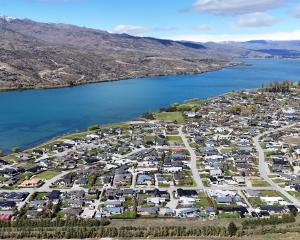A Central Otago-led group is shooting for the stars, planning to create New Zealand's first satellite programme from a space research centre based in Alexandra.
A funding application for $15 million towards the Centre for Space Science Technology, led by Alexandra research group Bodeker Scientific, was submitted to the Ministry of Business, Innovation and Employment this week as part of its Regional Research Institutes (RRI) initiative.
The $25 million RRI scheme, announced last year, supports research outside the main centres of Auckland, Wellington and Christchurch.
The Centre for Space Science Technology would build satellites and work alongside New Zealand industries to provide tailored information, at first using data from existing international satellites, then eventually from those it owns.
Research could include irrigation and agriculture, snow and ice, oceans and atmosphere, regional planning and hazard management, data telemetry and forestry.
Bodeker Scientific director Greg Bodeker said the satellites would be customised to meet industry needs.
"The first step is to sit down and talk to people about what they want. Innovation is a crucial part of the proposed business.''
He hoped the centre would launch its first satellite between late 2019 and early 2020 through Auckland-based company Rocket Lab, which was building a launch site on Mahia Peninsula, south of Gisborne.
The launch would mark the beginning of New Zealand's first satellite programme.
The proposed centre's headquarters would be in Alexandra.
Other offices would be in Dunedin, New Plymouth and Lincoln.
The centre would create the equivalent of 44 full-time positions, but many staff would work part-time, resulting in about 70 to 80 jobs, about half of which would be in Alexandra.
Its start date would be July 1, 2017, and it would use RRI funding for three years.
He hoped the centre would be self-sufficient by 2020.
Services would first be offered in Central Otago, then rolled out nationally, then internationally, Dr Bodeker said.
If the funding application was unsuccessful, it would be "kept on the backburner'' in the event the ministry announced another round of RRI funding, he said.
"But we'll also leave the door open for other avenues.''
Centre steering group member and Manuherikia Catchment Water Strategy Group deputy chairman Gary Kelliher, of Springvale, near Alexandra, said more and more farmers would be able to use the soil-moisture maps the centre would create as irrigation techniques became more sophisticated.
"With this technology, farmers will be able to get blanket information on soil moisture that they can't get now.''
Dr Bodeker said the chance of securing RRI funding was relatively slim, because there was likely to be strong competition.
"We wrote this proposal on a shoestring.‘‘I did it because it's the right thing for New Zealand. I can see so many applications for the future.''
Steering group chairman Barrie Wills, of Alexandra, said he understood about 14 applications were "on the go'' a few weeks ago.
Central Otago District Council economic development manager Warwick Hawker, who is also on the steering group, said the council had discussed funding the $50,000 application, but decided it did not have the money at that stage.
A $15,000 contribution would be considered in the council's draft annual plan if the proposal got to the next stage.
"I spent many hours on this because its economic impact on Central Otago would be very exciting.''
Central Otago Mayor Tony Lepper said it would be "absolutely fantastic'' for the region if the application was successful.
"We'll have to cross our fingers and see what comes of it. He [Dr Bodeker] has a lot of international contacts.''
Applicants will be notified by March 4 if they have been shortlisted and will make presentations to a Wellington panel in mid-March.













